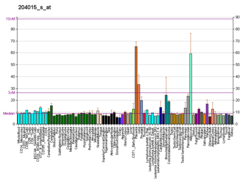DUSP4

Dual specificity protein phosphatase 4 is an enzyme that in humans is encoded by the DUSP4 gene.[5][6][7]
Function
[edit]The protein encoded by this gene is a member of the dual specificity protein phosphatase subfamily. These phosphatases inactivate their target kinases by dephosphorylating both the phosphoserine/threonine and phosphotyrosine residues. They negatively regulate members of the mitogen-activated protein (MAP) kinase superfamily (MAPK/ERK, SAPK/JNK, p38), which are associated with cellular proliferation and differentiation. Different members of the family of dual specificity phosphatases show distinct substrate specificities for various MAP kinases, different tissue distribution and subcellular localization, and different modes of inducibility of their expression by extracellular stimuli. This gene product inactivates ERK1, ERK2 and JNK, is expressed in a variety of tissues, and is localized in the nucleus. Two alternatively spliced transcript variants, encoding distinct isoforms, have been observed for this gene. In addition, multiple polyadenylation sites have been reported.[7]
In melanocytic cells DUSP4 gene expression may be regulated by MITF.[8]
References
[edit]- ^ a b c GRCh38: Ensembl release 89: ENSG00000120875 – Ensembl, May 2017
- ^ a b c GRCm38: Ensembl release 89: ENSMUSG00000031530 – Ensembl, May 2017
- ^ "Human PubMed Reference:". National Center for Biotechnology Information, U.S. National Library of Medicine.
- ^ "Mouse PubMed Reference:". National Center for Biotechnology Information, U.S. National Library of Medicine.
- ^ Guan KL, Butch E (Mar 1995). "Isolation and characterization of a novel dual specific phosphatase, HVH2, which selectively dephosphorylates the mitogen-activated protein kinase". The Journal of Biological Chemistry. 270 (13): 7197–203. doi:10.1074/jbc.270.13.7197. PMID 7535768.
- ^ Smith A, Price C, Cullen M, Muda M, King A, Ozanne B, Arkinstall S, Ashworth A (Jun 1997). "Chromosomal localization of three human dual specificity phosphatase genes (DUSP4, DUSP6, and DUSP7)". Genomics. 42 (3): 524–7. doi:10.1006/geno.1997.4756. PMID 9205128.
- ^ a b "Entrez Gene: DUSP4 dual specificity phosphatase 4".
- ^ Hoek KS, Schlegel NC, Eichhoff OM, Widmer DS, Praetorius C, Einarsson SO, Valgeirsdottir S, Bergsteinsdottir K, Schepsky A, Dummer R, Steingrimsson E (Dec 2008). "Novel MITF targets identified using a two-step DNA microarray strategy". Pigment Cell & Melanoma Research. 21 (6): 665–76. doi:10.1111/j.1755-148X.2008.00505.x. PMID 19067971. S2CID 24698373.
Further reading
[edit]- King AG, Ozanne BW, Smythe C, Ashworth A (Dec 1995). "Isolation and characterisation of a uniquely regulated threonine, tyrosine phosphatase (TYP 1) which inactivates ERK2 and p54jnk". Oncogene. 11 (12): 2553–63. PMID 8545112.
- Chu Y, Solski PA, Khosravi-Far R, Der CJ, Kelly K (Mar 1996). "The mitogen-activated protein kinase phosphatases PAC1, MKP-1, and MKP-2 have unique substrate specificities and reduced activity in vivo toward the ERK2 sevenmaker mutation". The Journal of Biological Chemistry. 271 (11): 6497–501. doi:10.1074/jbc.271.11.6497. PMID 8626452.
- Bonaldo MF, Lennon G, Soares MB (Sep 1996). "Normalization and subtraction: two approaches to facilitate gene discovery". Genome Research. 6 (9): 791–806. doi:10.1101/gr.6.9.791. PMID 8889548.
- Husi H, Ward MA, Choudhary JS, Blackstock WP, Grant SG (Jul 2000). "Proteomic analysis of NMDA receptor-adhesion protein signaling complexes". Nature Neuroscience. 3 (7): 661–9. doi:10.1038/76615. hdl:1842/742. PMID 10862698. S2CID 14392630.
- Chen P, Hutter D, Yang X, Gorospe M, Davis RJ, Liu Y (Aug 2001). "Discordance between the binding affinity of mitogen-activated protein kinase subfamily members for MAP kinase phosphatase-2 and their ability to activate the phosphatase catalytically". The Journal of Biological Chemistry. 276 (31): 29440–9. doi:10.1074/jbc.M103463200. PMID 11387337.
- Cadalbert L, Sloss CM, Cameron P, Plevin R (Oct 2005). "Conditional expression of MAP kinase phosphatase-2 protects against genotoxic stress-induced apoptosis by binding and selective dephosphorylation of nuclear activated c-jun N-terminal kinase". Cellular Signalling. 17 (10): 1254–64. doi:10.1016/j.cellsig.2005.01.003. PMID 16038800.
- Rual JF, Venkatesan K, Hao T, Hirozane-Kishikawa T, Dricot A, Li N, Berriz GF, Gibbons FD, Dreze M, Ayivi-Guedehoussou N, Klitgord N, Simon C, Boxem M, Milstein S, Rosenberg J, Goldberg DS, Zhang LV, Wong SL, Franklin G, Li S, Albala JS, Lim J, Fraughton C, Llamosas E, Cevik S, Bex C, Lamesch P, Sikorski RS, Vandenhaute J, Zoghbi HY, Smolyar A, Bosak S, Sequerra R, Doucette-Stamm L, Cusick ME, Hill DE, Roth FP, Vidal M (Oct 2005). "Towards a proteome-scale map of the human protein-protein interaction network". Nature. 437 (7062): 1173–8. Bibcode:2005Natur.437.1173R. doi:10.1038/nature04209. PMID 16189514. S2CID 4427026.
- Tresini M, Lorenzini A, Torres C, Cristofalo VJ (Feb 2007). "Modulation of replicative senescence of diploid human cells by nuclear ERK signaling". The Journal of Biological Chemistry. 282 (6): 4136–51. doi:10.1074/jbc.M604955200. PMID 17145763.
- Wang J, Shen WH, Jin YJ, Brandt-Rauf PW, Yin Y (Jun 2007). "A molecular link between E2F-1 and the MAPK cascade". The Journal of Biological Chemistry. 282 (25): 18521–31. doi:10.1074/jbc.M610538200. PMID 17452331.
External links
[edit]- Overview of all the structural information available in the PDB for UniProt: Q13115 (Human Dual specificity protein phosphatase 4) at the PDBe-KB.


 French
French Deutsch
Deutsch




